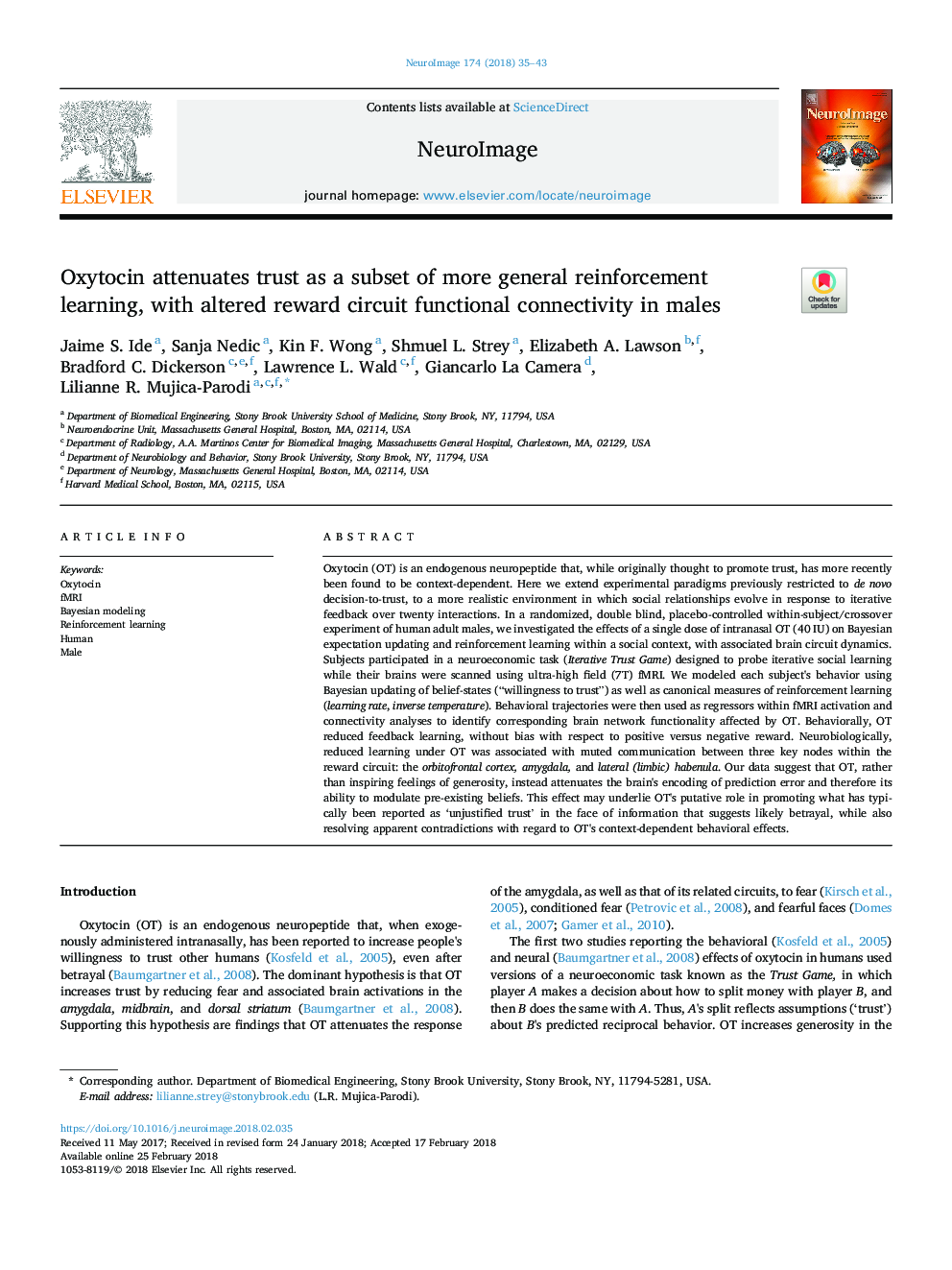| کد مقاله | کد نشریه | سال انتشار | مقاله انگلیسی | نسخه تمام متن |
|---|---|---|---|---|
| 8686900 | 1580836 | 2018 | 9 صفحه PDF | دانلود رایگان |
عنوان انگلیسی مقاله ISI
Oxytocin attenuates trust as a subset of more general reinforcement learning, with altered reward circuit functional connectivity in males
ترجمه فارسی عنوان
اکسی توسین اعتماد را بعنوان زیرمجموعه ی آموزش عمومی تقویت کننده کاهش می دهد، با اتصال به عملکرد مجتمع متحرک در مردان
دانلود مقاله + سفارش ترجمه
دانلود مقاله ISI انگلیسی
رایگان برای ایرانیان
کلمات کلیدی
موضوعات مرتبط
علوم زیستی و بیوفناوری
علم عصب شناسی
علوم اعصاب شناختی
چکیده انگلیسی
Oxytocin (OT) is an endogenous neuropeptide that, while originally thought to promote trust, has more recently been found to be context-dependent. Here we extend experimental paradigms previously restricted to de novo decision-to-trust, to a more realistic environment in which social relationships evolve in response to iterative feedback over twenty interactions. In a randomized, double blind, placebo-controlled within-subject/crossover experiment of human adult males, we investigated the effects of a single dose of intranasal OT (40 IU) on Bayesian expectation updating and reinforcement learning within a social context, with associated brain circuit dynamics. Subjects participated in a neuroeconomic task (Iterative Trust Game) designed to probe iterative social learning while their brains were scanned using ultra-high field (7T) fMRI. We modeled each subject's behavior using Bayesian updating of belief-states (“willingness to trust”) as well as canonical measures of reinforcement learning (learning rate, inverse temperature). Behavioral trajectories were then used as regressors within fMRI activation and connectivity analyses to identify corresponding brain network functionality affected by OT. Behaviorally, OT reduced feedback learning, without bias with respect to positive versus negative reward. Neurobiologically, reduced learning under OT was associated with muted communication between three key nodes within the reward circuit: the orbitofrontal cortex, amygdala, and lateral (limbic) habenula. Our data suggest that OT, rather than inspiring feelings of generosity, instead attenuates the brain's encoding of prediction error and therefore its ability to modulate pre-existing beliefs. This effect may underlie OT's putative role in promoting what has typically been reported as 'unjustified trust' in the face of information that suggests likely betrayal, while also resolving apparent contradictions with regard to OT's context-dependent behavioral effects.
ناشر
Database: Elsevier - ScienceDirect (ساینس دایرکت)
Journal: NeuroImage - Volume 174, 1 July 2018, Pages 35-43
Journal: NeuroImage - Volume 174, 1 July 2018, Pages 35-43
نویسندگان
Jaime S. Ide, Sanja Nedic, Kin F. Wong, Shmuel L. Strey, Elizabeth A. Lawson, Bradford C. Dickerson, Lawrence L. Wald, Giancarlo La Camera, Lilianne R. Mujica-Parodi,
